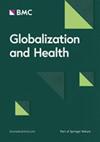实施数字健康护照进行 COVID-19 大流行病跨境管理的地理和实际挑战:叙述性审查和解决方案框架
IF 5.9
2区 医学
Q1 PUBLIC, ENVIRONMENTAL & OCCUPATIONAL HEALTH
引用次数: 0
摘要
传染病在全球迅速蔓延,最近的 COVID-19 大流行就是一个缩影,这凸显了对有效跨境大流行病管理战略的迫切需要。数字健康护照(DHPs)可以安全地存储和促进关键健康信息(包括疫苗接种记录和检测结果)的共享,已成为在大流行病期间实现安全旅行、获得基本服务和经济活动的一种有前途的解决方案。然而,DHPs 的实施面临着一些重大挑战,这些挑战既与地域差异有关,也与实际考虑因素有关,因此有必要采取综合方法,以便在全球范围内成功采用。在这篇叙述性综述文章中,我们确定并阐述了阻碍全球采用和有效利用 DHPs 的关键地理和实际障碍。地理障碍非常复杂,包括疫苗接种方面的差异、监管方面的不一致、各国在数据安全和用户隐私政策方面的差异、与互操作性和标准化相关的挑战以及技术基础设施的不足和对数字技术的有限使用。实际挑战包括疫苗禁忌症和突破性感染的可能性、自然免疫的不确定性以及标准测试在评估感染风险方面的局限性。为了解决地域差异并增强 DHP 的功能性和互操作性,我们提出了一个强调国际合作的框架,以实现疫苗和测试资源的公平获取。此外,我们还建议开展国际合作,建立统一的疫苗监管框架,采用全球公认的数据隐私和保护标准,实施互操作性协议,并采取措施弥合数字鸿沟。应对实际挑战需要采取细致的方法来评估个人风险,并通过严格的健康检查和个人感染预防措施来加强 DHP 的实施。总之,这些举措有助于制定稳健、包容的跨境大流行病管理战略,最终促进全球社会在面对当前和未来的大流行病时更加安全、更加互联互通。本文章由计算机程序翻译,如有差异,请以英文原文为准。
Geographical and practical challenges in the implementation of digital health passports for cross-border COVID-19 pandemic management: a narrative review and framework for solutions
The rapid global spread of infectious diseases, epitomized by the recent COVID-19 pandemic, has highlighted the critical need for effective cross-border pandemic management strategies. Digital health passports (DHPs), which securely store and facilitate the sharing of critical health information, including vaccination records and test results, have emerged as a promising solution to enable safe travel and access to essential services and economic activities during pandemics. However, the implementation of DHPs faces several significant challenges, both related to geographical disparities and practical considerations, necessitating a comprehensive approach for successful global adoption. In this narrative review article, we identify and elaborate on the critical geographical and practical barriers that hinder global adoption and the effective utilization of DHPs. Geographical barriers are complex, encompassing disparities in vaccine access, regulatory inconsistencies, differences across countries in data security and users' privacy policies, challenges related to interoperability and standardization, and inadequacies in technological infrastructure and limited access to digital technologies. Practical challenges include the possibility of vaccine contraindications and breakthrough infections, uncertainties surrounding natural immunity, and limitations of standard tests in assessing infection risk. To address geographical disparities and enhance the functionality and interoperability of DHPs, we propose a framework that emphasizes international collaboration to achieve equitable access to vaccines and testing resources. Furthermore, we recommend international cooperation to establish unified vaccine regulatory frameworks, adopting globally accepted standards for data privacy and protection, implementing interoperability protocols, and taking steps to bridge the digital divide. Addressing practical challenges requires a meticulous approach to assessing individual risk and augmenting DHP implementation with rigorous health screenings and personal infection prevention measures. Collectively, these initiatives contribute to the development of robust and inclusive cross-border pandemic management strategies, ultimately promoting a safer and more interconnected global community in the face of current and future pandemics.
求助全文
通过发布文献求助,成功后即可免费获取论文全文。
去求助
来源期刊

Globalization and Health
PUBLIC, ENVIRONMENTAL & OCCUPATIONAL HEALTH-
CiteScore
18.40
自引率
1.90%
发文量
93
期刊介绍:
"Globalization and Health" is a pioneering transdisciplinary journal dedicated to situating public health and well-being within the dynamic forces of global development. The journal is committed to publishing high-quality, original research that explores the impact of globalization processes on global public health. This includes examining how globalization influences health systems and the social, economic, commercial, and political determinants of health.
The journal welcomes contributions from various disciplines, including policy, health systems, political economy, international relations, and community perspectives. While single-country studies are accepted, they must emphasize global/globalization mechanisms and their relevance to global-level policy discourse and decision-making.
 求助内容:
求助内容: 应助结果提醒方式:
应助结果提醒方式:


